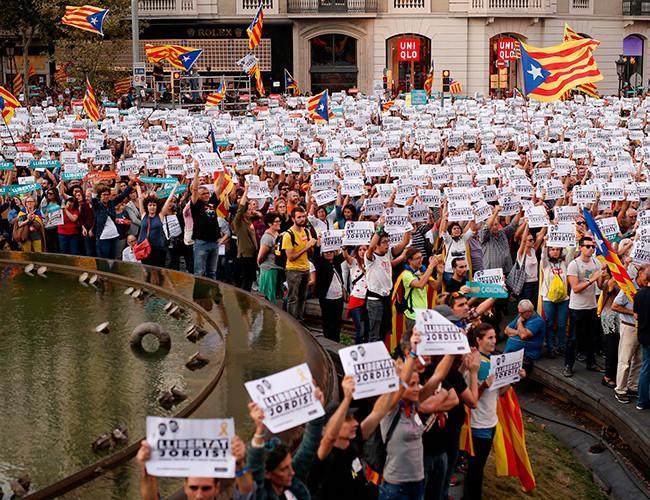
Catalonia’s separatists were planning their response on Oct. 22 after Spain took drastic steps to stop the region from breaking away by dissolving its separatist government and forcing new elections.
Catalan leader Carles Puigdemont and his regional executive -- who sparked a major political crisis by holding an independence referendum on Oct. 1 -- will be stripped of their jobs and their ministries taken over under measures announced on Oct. 21 by Prime Minister Mariano Rajoy.
“Yesterday there was a fully-fledged coup against Catalan institutions,” said Catalan government spokesman Jordi Turull.
“What happens now, with everyone in agreement and unity, is that we will announce what we will do and how,” he told Catalunya Radio.
Rajoy has taken Spain into uncharted legal waters by moving to wrest back powers from the semi-autonomous region, which could see Madrid take control of the Catalan police force and replace its public media chiefs.
The move sparked outrage among separatists, with nearly half a million taking to the streets of regional capital Barcelona and Puigdemont declaring Rajoy guilty of “the worst attack on institutions and Catalan people” since the dictatorship of Francisco Franco.
Among other repressive measures, Franco -- who ruled from 1939 until 1975 -- took Catalonia’s powers away and banned official use of the Catalan language.
Though Catalans are deeply split on whether to break away from Spain, autonomy remains a sensitive issue in the northeastern region of 7.5 million people, which fiercely defends its language and culture and has previously enjoyed control over its policing, education and healthcare.
Rajoy said he had no choice but to force Puigdemont out as he refuses to drop his threat to declare independence after a referendum that had been declared unconstitutional.
Responding to accusations of a “coup”, Foreign Minister Alfonso Dastis retorted: “If there is a coup d’etat, it is one that has been followed by Mr. Puigdemont and his government.”
He told BBC television: “What we are doing is following strictly the provisions of our constitution.”
Spain’s Senate is set to approve the measures by the end of next week. Rajoy’s conservative Popular Party (PP) holds a majority in the upper house, while other major parties also back his efforts to prevent a break-up of the nation.
In a crisis that has sent jitters through one of Spain’s most important regional economies and rattled the stock markets, Rajoy has ordered fresh elections to be called within six months of the Senate hearing, which would see polls held by mid-June at the latest.
Separatist parties of all political stripes, from Puigdemont’s conservatives to the far-left, have dominated the Catalan parliament since the last elections in 2015, holding 72 seats out of 135.
Ahead of a meeting of Catalan parties Monday to set a date and agenda for a crucial session of the regional parliament to debate next steps, Turull insisted on RAC1 radio that elections were “not on the table.”
Political analysts warn Rajoy faces a serious struggle to impose control over the unruly region.
Potential scenarios include Catalan civil servants and police refusing to obey orders from central authorities.
“The basic problem is that you have to govern Catalonia with the active opposition of a large part of the population,” analyst Jose Fernandez-Albertos told AFP.
Asked if Puigdemont will be arrested if he shows up for work, Dastis tried to strike a reassuring tone.
“We are not going to arrest anyone,” he told the BBC, dismissing the idea of the army having to be brought in to enforce order.
But he warned that if Puigdemont’s government keeps trying to give orders, “they will be equal to any group of rebels trying to impose their own arbitrariness on the people of Catalonia.”
National police said two young people had been charged after physically assaulting police at Oct. 21y’s Barcelona protest, which saw some 450,000 separatists flood the streets shouting “freedom” and “independence.”
Puigdemont says 90 percent backed a split from Spain in the referendum, but turnout was given as 43 percent as many anti-independence Catalans stayed away.
Polls suggest the wealthy region is evenly split over independence, with separatists saying it pays too much into national coffers but their opponents arguing it is stronger as part of Spain.
Madrid has received vocal backing from European leaders, with EU parliament chief Antonio Tajani stressing on Oct. 22 that neighbors would refuse to recognise Catalonia if it unilaterally declared independence.
“It is not by degrading nationhood that we reinforce Europe,” he told Italian newspaper Il Messaggero.